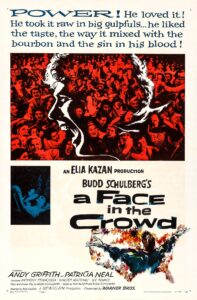In his little old town of Riddle, that’s where scruffy vagabond Larry “Lonesome” Rhodes earned his southern Americana charm. His bluesman aptitude to carry a tune. His folksy witticisms. No, Riddle does not really exist. It’s more of a composite, or, rather, a compost heap, he says. Still, it runs deep through his very veins, the soul and the force of American vivacity.
The camera keeps centered on Lonesome (Andy Griffith) in A Face in the Crowd (1957), his x-factor, but it is grounded and moved through the aspiring radio producer Marcia Jeffries (Patricia Neal). She’s got ambition; she’s mighty bright, too. In her pursuit to grow her local radio show, she travels northeast Arkansas drunk tanks for personality, a face. Who’s face? Why, it could be yours, she says, or yours, or yours; people are fascinating wherever you find ’em. And indeed they are fascinating in the Tomahawk County Jail. It, of course, holds Mr. Lonesome Rhodes.
Marcia’s in luck: she’s found the type with charisma to spare. He’s unrefined, honest, he speaks to the ordinary American people tucked in the ordinary corners of farmland to cities left desperate for a voice. They adore his voice and his guitar and his ideas. And, eventually, seamlessly from earnest, they come to adore his hubris.
The film chronicles the rise and bitter fall of Rhodes. With success in radio came so in television and advertisement and populist politic. Through the direction and disobedience of Marcia’s management, Rhodes finds himself on the top of America, grasping at the hearts of viewers and, to their detriment, leading them into his political demagoguery.
But he laughs his way through this. A booming, thick laugh, it asserts itself into the room, a sort of militaristic call. Rhodes puts his entire self into it, he says, like he does everything. But the self is subject to change, it molds to circumstance, expands and contracts, it adapts to powerful positions and does so unapologetically. The self Rhodes puts into his laugh, by his last high TV rating, is reflective only of the manipulated audience perception, that not of a deeply corrupt persona but an image of a man with shirt-of-his-back sentimentality. He’s even fooled himself.
There’s a palpable prescience to the film, the kind that almost lends itself to the obvious: the machine of the promise will lend an individual power only in return of posing as the cog. If one fails to participate, however, the machine will swallow. And so the choice is laid out very clear to those interested in attaining influence, and those obsessive of it: to sustain glory one must enact onto spectators whatever it may take.
A Face in the Crowd, directed by Elia Kazan from a screenplay by Budd Schulberg, plays now as prophetic poetry, the grandeur of sensationalism and its implications, what would enter so sudden in the culture. Indeed, the effortless rise of fascism, the film informs us, would be blatantly televised.

